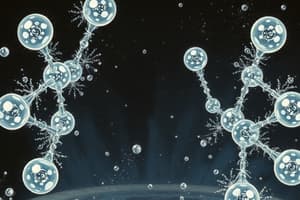Podcast
Questions and Answers
What is the condition for a compound to have a total charge of zero?
What is the condition for a compound to have a total charge of zero?
- It must include only neutral atoms.
- It should contain an equal number of protons and electrons.
- The number of cations must equal the number of anions. (correct)
- The sum of all positive charges must equal the sum of all negative charges. (correct)
Which statement correctly describes cations?
Which statement correctly describes cations?
- Cations have fewer protons than electrons.
- Cations have no charge and exist as neutral atoms.
- Cations are formed when atoms gain protons.
- Cations are positively charged ions. (correct)
How do ions contribute to the conduction of electricity?
How do ions contribute to the conduction of electricity?
- Ions must be in a gaseous state to conduct electricity.
- Only cations can conduct electricity.
- Electricity is conducted through the movement of neutral atoms.
- Moving ions conduct electricity. (correct)
What happens to an atom when it gains electrons?
What happens to an atom when it gains electrons?
In what scenario are ions with opposite charges most significantly affected?
In what scenario are ions with opposite charges most significantly affected?
Flashcards are hidden until you start studying
Study Notes
Atomic Structure
- Atoms are neutral when they have the same number of protons and electrons.
- Protons are positively charged particles in the nucleus.
- Electrons are negatively charged particles that orbit the nucleus.
Ions
- Ions are charged atoms.
- Cations are positively charged ions formed when an atom loses electrons.
- Anions are negatively charged ions formed when an atom gains electrons.
- Oppositely charged ions attract each other.
- Moving ions conduct electricity.
- Compounds must have a neutral charge, so the number of cations and anions must balance to achieve a net charge of zero.
Studying That Suits You
Use AI to generate personalized quizzes and flashcards to suit your learning preferences.




